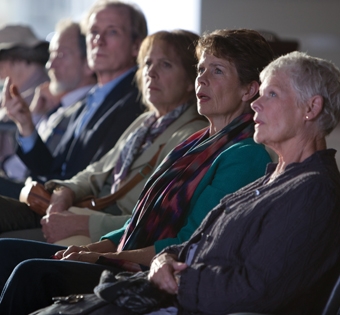Even in their autumn years, Baby Boomers discover that old dogs can learn new tricks.
Do not go gentle into that good night, Old age should burn and rage at close of day; Rage, rage against the dying of the light.
—Dylan Thomas
I did not think of this verse from Dylan Thomas’ most famous poem the night my wife and I went to see The Best Exotic Marigold Hotel (Fox Searchlight). What I did think about as the lights came up and the credits began to roll on director John Madden’s engaging and sympathetic drama about seven British retirees trying to fashion a new life in a rundown Indian hotel was that there did not seem to be a single person in the audience under 60.
Were the hopes and fears addressed in this tale about aging, decline, and loss of no interest to anyone not on the brink of retirement?
When Thomas wrote “Do Not Go Gentle into That Good Night” in 1951, America was halfway through giving birth to the Baby Boomers, the generation that would grow up worshipping its own youthfulness and railing against its elders, famously commanding us to never trust anyone over 30.
But now 10,000 Baby Boomers are turning 65 every day—and will be doing so for the next two decades. Gentle or not, we are headed into that good night.
And in The Best Exotic Marigold Hotel, Madden and his cast have captured many of the fears and trepidations of the growing tide of Boomers crossing over into the undiscovered country. In a film that occasionally crosses the line into sentimentality, there is still a willingness to name and face more than a few of the demons that haunt our approach to the close of day and the dying of the light.
Will we be able to take care of ourselves or to arrange for someone else to provide the care we will need? This is a fear haunting several of the characters in Marigold Hotel. Evelyn Greenslade (Judi Dench) is a widow who discovers her recently deceased husband has left her nearly destitute, while Douglas (Bill Nighy) and Jean Ainslie (Penelope Wilton) have entrusted their life savings to a daughter not nearly as clever as she claims to be. And Muriel Donnelly (Maggie Smith) is a former governess cast aside by the family she cared for and raised. They find themselves short of the fiscal resources they had hoped would see them through their golden years and must adjust to a smaller, meaner life than they had expected.
How will we negotiate the shift into retirement, the loss of status that comes with giving up our jobs, and the gradual erosion and decline of our faculties and powers?
Most Hollywood blockbusters are made for adolescent males, and, like teenagers, the heroic protagonists in these action films wrestle with the challenges that come with exploding physical and mental powers.
Alternatively, the aging characters in Marigold Hotel must deal with decline and loss. Madge Hardcastle (Celia Imrie) and Norman Cousins (Ronald Pickup) are two romantic souls who, as Madge says, find themselves single by choice, just not their own. The charms and attractions that once drew dates and mates like moths now fail them. And Muriel, who ran an entire household, finds herself unable to cross a room.
In Madden’s film these seven British retirees have come to the decidedly not-so-terrific and rather rundown Marigold Hotel in Jaipur, India mostly because they need somewhere inexpensive to live. Having outsourced their retirement to India, they now find themselves in a strange place, attended to by a group of young locals who do not know or appreciate their British ways and customs.
Like many elderly, some of these retirees are frightened and annoyed by those who attend to them and chagrined that they could not spend their golden years among “their own.” And there is, as is also so common among the older generation, a good deal of judgment about the poor quality of service provided by the indolent and undisciplined youth. The fact that our parents and grandparents once thought the same of us seems to make no difference in our eagerness to judge today’s young.
Still, there is a budding spirit of adventure among several of the new guests of the Marigold Hotel. Graham Dashwood (Tom Wilkinson) is a man willing to take India on its own terms, to treasure and celebrate its vitality, color, and passion, and to recognize the beauty and joy of its people.
Though initially stymied by her poor fortune, Evelyn finds and fashions a new job and life in the chaos of Jaipur and discovers a way to mentor the young people whose service she and her peers are so ready to criticize.
And Douglas, trapped in a marriage that has become stilted and lifeless, travels each day to discover and savor new experiences in a world exotic and overwhelming. Even Muriel (somewhat incredibly) is able to recognize the humanity and sweetness of people whose lives are, in the end, all too similar to her own tragic experience.
In the end, Madden’s film is a tale about grace, about the choice not to rage at the decline of our faculties and powers, but to find the possibility of another and different day. To paraphrase Lord Alfred Tennyson’s “Ulysses,” the aging guests in the Marigold Hotel may no longer be that force of nature which once moved heaven and earth, but they still possess hearts and minds capable of wonder, awe, and love. And that is something for every elder to boom about.
This article appeared in the August issue of U.S. Catholic (Vol. 77, No. 8, pages 40-41).















Add comment